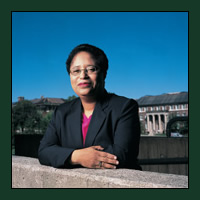 "From Uncertainty to Opportunity: Creating a Comprehensive Energy Roadmap and the Human Capital to Make It Happen"
"From Uncertainty to Opportunity: Creating a Comprehensive Energy Roadmap and the Human Capital to Make It Happen"
Dr. Shirley Jackson, President, Rensselaer Polytechnic Institute
Civic Scientist Distinguished Lecture Series
Baker Institute
November 13th, 2007
..............................................................................................................................................................
Dr. Shirley Ann Jackson is the 18th President of Rensselaer Polytechnic Institute, Troy, N.Y., and Hartford, Conn., the oldest technological research university in the U.S..
Described by Time Magazine (2005) as “perhaps the ultimate role model for women in science,” President Jackson has held senior leadership positions in government, industry, research, and academe.
Describing her as “a national treasure,” the National Science Board selected Jackson as its 2007 recipient of the Vannevar Bush Award for “a lifetime of achievements in scientific research, education, and senior statesman-like contributions to public policy.”
Since her arrival in 1999, Dr. Jackson has fostered an extraordinary renaissance at Rensselaer. This institutional transformation has included the hiring of more than 180 new faculty and a corresponding reduction in class size and student/faculty ratios; initiating and/or completing $500 million in new construction and renovation of facilities for research, teaching, and student life; a doubling of research awards; and innovations in curriculum, undergraduate research, and student life initiatives. President Jackson secured a $360 million unrestricted gift to the university (2001), launched the $1 billion Renaissance at Rensselaer Campaign (2004), and expanded the goal of the campaign to $1.4 billion (2006) when the initial goal was met earlier than anticipated.
Dr. Jackson is past president of the American Association for the Advancement of Science (AAAS) (2004) and former chairman of the AAAS Board of Directors (2005), a member of the National Academy of Engineering, a member of the American Philosophical Society, a Fellow of the American Academy of Arts and Sciences, the American Physical Society, and AAAS. Jackson has advisory roles and involvement in several other prestigious national organizations. She serves as a Trustee of the Brookings Institution, a Life Member of the M.I.T. Corporation, and a member of the Council on Foreign Relations. She is a member of the Executive Committee of the Council on Competitiveness and serves on the board of Georgetown University. She also serves on the Board of Directors of NYSE Euronext (and is Chairman of the New York Stock Exchange Regulation Board), the Board of Regents of the Smithsonian Institution, and is a director of several major corporations including FedEx, IBM, and Marathon Oil.
She was appointed Chairman of the U.S. Nuclear Regulatory Commission (NRC), 1995-1999, by U.S. President William J. Clinton. At the NRC, Dr. Jackson reorganized the agency and completely revamped its regulatory approach, by articulating and moving strongly to risk-informed, performance-based regulation. To foster collaboration and nuclear safety assistance worldwide, while at the NRC, she also spearheaded the formation of the International Nuclear Regulators Association and served as the group’s first chairman. Prior to that, she was a theoretical physicist at the former AT&T Bell Laboratories and a professor of theoretical physics at Rutgers University.
Dr. Jackson holds an S.B. in physics and a Ph.D. in theoretical elementary particle physics from M.I.T., and 44 honorary doctoral degrees.
Over the past several years, President Jackson has worked successfully to bring national attention to the underinvestment in basic research and to what she has dubbed the “Quiet Crisis” in America – the threat to the United State’s capacity to innovate due to the looming shortage in the nation’s science and technology workforce. The shortfall results from a record number of retirements on the horizon, and not enough students in the pipeline to replace them because fewer American students are studying science, mathematics, and engineering and fewer students are coming from abroad to study and stay. President Jackson notes that, if the U.S. is to maintain its leadership in science and technology, we must increase the number of people choosing to pursue careers in science and technology, and to do that, we must tap into all of the talent this nation has to offer, including women and minorities – what she calls the “underrepresented majority.”
President Jackson has urged a national focus on energy research as a focal point to excite and encourage greater interest in science and engineering careers, noting that “energy security is the space race of this millennium."
Photo and Biography Courtesy of
Rensselaer Polytechnic Institute.
